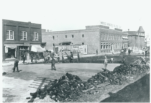Laying It Out: Show your value or be accused of abuse
By Medicine Hat News Opinion on November 21, 2020.
In a Postmedia article Thursday headlined “Audit demanded after more than 800,000 ineligible people get CERB,” Conservative MP Kelly McCauley demands an explanation for the “remarkable” $1.7-billion “cost to the taxpayer.” CERB was meant for tax filers who made $5,000 or more in 2019, and according to records from Canada Revenue, 823,850 people who hadn’t filed a return managed to receive it. According to the story, CRA has yet to explain how those people were able to claim the income-replacement benefit. According to the truth, the explanation is publicly available information. The tax deadline was extended, a significant portion of those people will have now and are still going to file their returns and much of that $1.7 billion will be recouped. Someone dial Nancy Drew, we’ve got a real caper on our hands. The story hit online circles and was shredded for its poor journalistic effort, but the entire fiasco sheds light on a much bigger problem with society’s worldview: We are valued by our ability to work, and defined by the obstacles that might prevent it. Poor people are just lazy, and we don’t reward lazy. When corporations need a handout, our governments fork over blank cheques on the regular, but the second a human is in trouble it’s, “Listen, you can’t keep coming to us for help.” For starters, let’s pretend for a moment the story was accurate, and the Edmonton-West MP was citing a full $1.7 billion that “shouldn’t” have been given to these “ineligible” Canadians. CERB paid out $81 billion between April and Oct. 3, so the “ineligibles” would have accounted for a whopping 2.1% of that – at a time when the world was in panic mode and every decision was made on the fly then altered by the minute. McCauley was right, that’s “remarkable.” Second, the story says these ineligible Canadians “received $2,000 monthly cheques,” while a two-second trip down abacus lane shows that if 823,850 people received a combined $1.7 billion, that means they received one CERB payment each. Someone help Popeye to his feet – the shock is just too much. Lastly, the figure cited by McCauley – an Alberta federal MP – as “a huge amount” that disappeared while “people were losing their homes and really needed help,” is laughably similar to the $1.6 billion lost by the UCP that had Alberta’s auditor general suggesting it was one of the worst reviews of fiscal management ever. Canada has 38 million people and will get much of the $1.7 billion back. Alberta has 4.4 million and its government is Richie Rich with a hole in the pocket of his tuxedo shorts. The point is, $1.7 billion at the federal level is absolutely not “a huge amount,” and it makes little sense from a financial perspective to split hairs over it. But when the budget in question involves income support for humans in a time of need, griping over decimal points isn’t nonsensical, it’s cruel. No matter what the situation is, and no matter how many people a program or organization helps, there are always those who focus on the so-called abusers of the system. They take anecdotal stories about “this one guy they know of who totally scammed” the government or that charity, and they use it to formulate their excuse for limiting the service. The result is hindered service, which is cited as reason for more limits – and around and around we go. “They stole CERB” is no different than “they won’t work if you give them food, or welfare, or AISH.” These tales of people abusing the system circulate through our society and they shape how we view each other. The silent overwhelming majority is never heard from, while the statistical anomalies are snatched up by politicians like McCauley and swallowed whole by certain media. Meanwhile, Dr. Deena Hinshaw recently said 10 per cent of COVID-positive patients went to work, or stayed at work, while experiencing symptoms. Workers with paid sick leave in this province are in the minority, and the available federal benefit to offset that is flawed, limited and less than a minimum-wage equivalent. Before COVID, we all did it. We consider our ability to work through illness a point of pride, and we tend to judge those who use up their sick days because “they can’t handle a little cold.” At the News, we get the paid sick days and we have good benefits, but like many businesses, we’re simply short on actual staff. If someone gets sick they have to weigh their symptoms against the guilt of leaving their tasks in the laps of other employees – an issue I’ve witnessed at every job I’ve ever had. But while the realities consistently prove that people aren’t just wanting to work, they’re enslaved by its necessity, we still believe en masse that poverty and laziness go hand in hand. What’s worse, the dollar sums used to help people are always drops within the drops of the bucket compared to that which we use to bail out corporations and shareholders. And as long as we give credence to the ramblings of men like McCauley and the wealthy interests they serve, we’ll continue in a system where corporations are too big to fail and poor people are too small to save. Scott Schmidt is the layout editor for the Medicine Hat News. He can be reached by email at sschmidt@medicinehatnews.com 20-19




